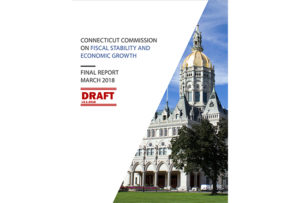Legislature orders more study of fiscal stability commission’s recommendations
 In the wake of its budget agreement, state legislators have ordered the formation of several new panels to further study some of the much-ballyhooed Commission on Fiscal Stability and Economic Growth”™s recommendations.
In the wake of its budget agreement, state legislators have ordered the formation of several new panels to further study some of the much-ballyhooed Commission on Fiscal Stability and Economic Growth”™s recommendations.
A seven-member panel will study rebalancing state taxes with the aim of stimulating economic growth without raising net new taxes, including an evaluation of new revenue sources for cities and towns, and incorporating the work of a State Tax Panel that was formed in 2015.
A separate six-member panel will look at a 30-year contribution of lottery net proceeds to the Teachers’ Retirement Fund to address unfunded liabilities, re-amortization of remaining fund liabilities in 2025, and the creation of a hybrid defined benefit/defined contribution plan for new teachers.
In addition, the Office of Policy and Management will hire a consultant to identify $500 million in expense reductions and revenue collection improvements. The commission had called for a $1 billion reduction.
The commission, consisting of 14 CEOs, was created by Gov. Dannel Malloy in December as part of the bipartisan state budget he signed into law on October 31. Its brief was to develop and recommend policies to achieve state government fiscal stability and promote economic growth and competitiveness within the state.
The recommendations in its report, issued in March, included bringing back highway tolls and changing how the state conducts collective bargaining with unions ”“ which were among several suggestions the new budget does not include.
“We are pleased that several studies of proposals made by the Commission were authorized as part of the bill, indicating serious interest in our work,” commission co-chairs Robert Patricelli and Jim Smith said in a statement. “These studies are only seeds, which might grow into structural reform in future years ”“ rather than reform itself ”“ but it is a start down the long road of fixing our state’s deep-seated problems.”
“Nevertheless,” they continued, “it must be said that the legislature once again focused on short-term budget fixes rather than on long-term structural reform. Perhaps that is all that can realistically be expected in a short session and in an election year.”
That criticism was echoed by Connecticut Business & Industry Association President and CEO Joe Brennan.
The commission”™s report “showed in stark terms how the state”™s recurring deficits and unfunded long-term liabilities are suppressing economic growth,” Brennan said. “While there was controversy around some of the commission”™s recommended solutions, the problems the commission highlighted are not going to go away.
“Now,” Brennan continued, “as we pivot to election season, it”™s critical that voters get to know their candidates and choose those who recognize the urgency needed to aggressively attack our state”™s most pressing economic problems.”
While the legislature and groups like the CBIA supported the commission, a recent poll by InformCT found that the vast majority of Connecticut residents were unaware of its existence.